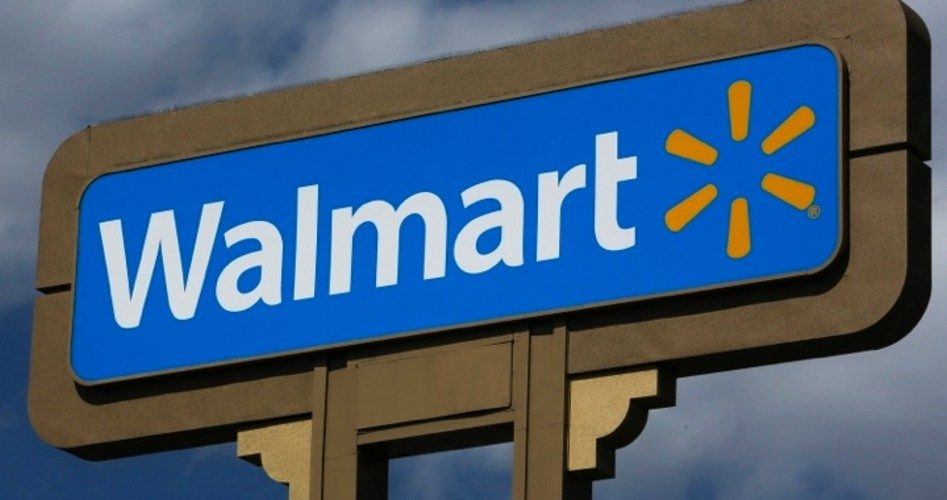
When Washington, D.C.’s city council passed an ordinance raising the minimum wage just for Walmart’s employees, Walmart threatened to pull five stores planned for the D.C. area — three of which were already under construction. But after Mayor Vincent Gray vetoed the measure and the council couldn’t override it, Walmart went ahead with two of them, both of which opened last Wednesday.
People lined up around the block to get into the stores when they opened, many happy not to have to drive to Virginia or Maryland to find a Walmart. There was even the requisite small group of protesters at each location, decrying Walmart’s low wages and poor working conditions. But most were happy that the stores were finally open.
Shopper Pamela Scott said, “I will never go to a Walmart in Maryland again. I live in D.C. and that’s where I want to shop. I’m going to be here at least three or four times a week, as often as I can.”
Michael Ferrick, initially skeptical about Walmart, stopped in for some doughnuts on his way to work on Wednesday and commented, “This is a brand-new neighborhood … and it’s pretty exciting. I mean, the whole city’s changing in D.C. … everything’s new.”
Things may be changing in D.C., but not on the city council. The day after the openings, the council voted unanimously again to raise the minimum wage, only this time in stages, from the present $8.25 an hour to $11.50 by 2016, adjusting it for inflation thereafter.
Perhaps the real world of shoppers enjoying low prices, wide selection, and convenience, and employees happy to be working for the retail giant might be enough to make the city council reconsider. From Walmart’s own website come some “Economic Opportunity Facts” that resulted in more than 23,000 people applying for the 800 job openings in the two new stores:
For some, retail is a first job and [the] chance to gain skills to succeed in the workplace. For others, it’s part-time work — [for] students stretching their financial aid [or] a teacher working over the summer.
And for many, it is a chance to build a meaningful, long-term career….
Entry level jobs often lead to bigger jobs. At Walmart, you can climb the ladder from a stocker or a cashier to a department manager, a store manager, and beyond. Depending on the time of year, there are [from] 15,000 to 50,000 job openings at Walmart U.S.
About 75% of our store management teams started as hourly associates, and they earn between $50,000 and $170,000 a year … Every year we promote about 160,000 people globally to jobs with more responsibility and higher pay.
In addition Walmart provides health insurance, education assistance, retirement plans, cash bonuses, and employee discounts.
Doug McMillon started as an intern with Walmart in the summer of 1984, left to get an MBA, and returned in 1990 to work full-time at a Walmart in Tulsa, Oklahoma. Sixteen years later he was promoted to president and CEO of Sam’s Club. In February he will take over as CEO of Walmart International.
Not everyone gets to be CEO by starting as a stocker; but it’s possible, and that’s the point that the city council seems to be missing. If the stores aren’t built, there won’t be any opportunities for anyone. As one person expressed it, “$12.50 an hour is a lot more than $8.25 an hour, but $12.50 an hour times zero is a lot less.”
Even liberals are shopping at the new Walmart stores. For example, Sarit Lisogorsky considered Walmart as “morally bankrupt” but shopped there on Wednesday anyway:
Morally, I don’t agree with Walmart’s practices. I wish they were different, but I am here, so maybe I am not a very moral person.
[But] the trip was worth it…
The Rev. Graylan Hagler, pastor of the Plymouth Congregational United Church of Christ, a supporter of the minimum wage hike that Mayor Gary vetoed, said:
I know some of my congregants are going to be shopping there. I have not called for a boycott or anything like that.
But … when you make this corporation richer, it’s at the expense of making somebody [else] poorer.
This flies in the face of the reality that has grown Walmart from a single store in Bentonville, Arkansas, in 1945 to the largest retailer in the world with more than 11,000 stores manned by over two million employees and generating revenues approaching half a trillion dollars a year. What has happened time and again is that people shop at Walmart because they are saving money, not spending extra for the privilege. There is no force or coercion involved. And the benefits ripple out from each store in ever-widening circles. Customers live better, workers clamor for an opportunity to work there, and suppliers expand as well: truck drivers, warehousemen, factory workers, farmers, carpenters, plumbers, electricians, day laborers, security officers, steel workers, bricklayers, and so on.
Competitors shape up as well. As a blogger noted:
Walmart provides indirect benefits in other ways, too. Local grocers like Target and Safeway, as well as small mom-and-pop stores, are all disciplined whenever a Walmart moves into the area.
Even consumers who only shop at Target and Safeway receive the benefits of lower prices and better service … because they have to compete against Walmart.
This isn’t just theory. That blogger was forced to do business at a local Safeway store that had a reputation for poor service, long checkout lines, and surly cashiers. He explained:
Now that the Safeway is in direct competition with Walmart for groceries, the service at Safeway has suddenly started to improve. The store has just hired a new manager … in response to the new competitor in the neighborhood.
Who knows? Maybe the Rev. Hagler might just look past his prejudices and his upsidedown economy theory that only when “someone wins someone else must lose” and stop in at his brand-new local Walmart for some doughnuts and get an education in how the real world works. And then, just maybe, he might invite some of his friends on the city council to stop in as well.
Photo of Walmart sign: AP Images
A graduate of Cornell University and a former investment advisor, Bob is a regular contributor to The New American magazine and blogs frequently at www.LightFromTheRight.com, primarily on economics and politics. He can be reached at [email protected]



